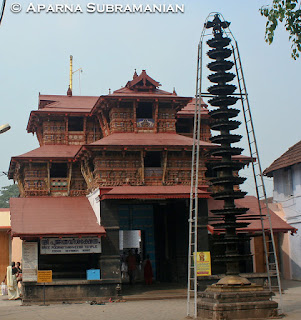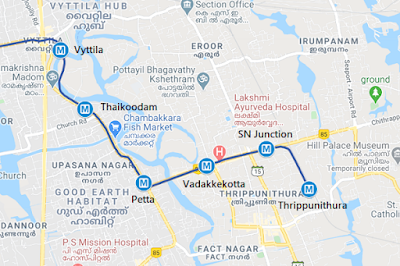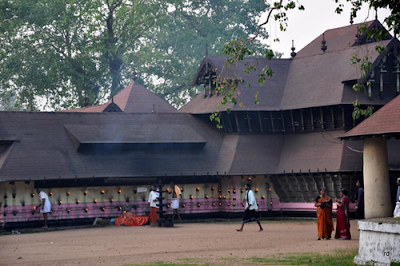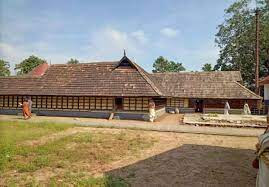 |
| Sree Poornathrayeesa Temple, Thirupanithura.:smundanat.blogspot.com |
Sree Poornathrayeesa temple of Thirupanithura near Kochi in the SW Indian State of Kerala dedicated to Mahavishnu is a popular temple and the deity is the family god of the erstwhile Kochi royal family whose capital was Thirupanithura. Among the Sri Vishnu temples, it is a rare one where God Vishnu is enshrined in a sitting posture under the 5-headed hood of serpent Aananthan (Adisesha) reverentially forming the cover over the lord.
The famous temple that is being visited by lots of pilgrims has a host of several interesting temple festivals and traditions. The annual 8 - day Vrischikolsavam festival (November - December) and Seeveli (also spelled seevali) ritual attract lots of devotees. Since the middle of 2019, temple authorities has restricted visitors to the temple and limited the festivities as a precaution against the COVID -19 pandemic. Participation of elephants in Seeveli has been an integral part of this temple tradition for centuries. The temple conducts three types of traditional festivals ''Ankuraadi (with full rituals and other colorful cultural programmes), Padahaadi (only peripheral colourful programmmes without any traditional rituals) and ,Dwajhadi (strictl traditional rituals).''
 |
| Location map Thirupanithura, Kerala . themetrorailguy.com/ |
A unique and rare temple ritual of Sree Poornathrayeesa temple is Sankara-Narayana Vilakku (Shiva and Vishnu) and Laksmi-Narayana Vilakku (Goddess Lakshmi and Lord Vishnu). This kind of ritual is not heard of in adjacent Tamil Nadu. Participation of Utchavar from a Shiva temple and of Kali in a Vishnu temple in Tamil Nadu is a rare. Unlike Kerala where Nambooderis work as priests/pundits in Shiva, Vishnu and Sakthi temples, in Tamil Nadu Shiva temples and Shiva temples, particularly associated with Agama Shastras, puja and temple rituals are conducted by trained Brahmi Shivacharyas (followers of Shivism) and Brahmin Bhattacharyas (followers of Vaishnavism propounded by Sri Ramanujacharya. As for Sakthi temples in Tamil Nadu both Brahmin and trained Pujaries from other castes conduct the rituals in places like Mariamman kovils across the state.
 |
| Chottanikkara Bhagavathy temple, Kerala teluguone.com |
Above image: In the Chottanikkara temple,Kerala the Goddess is worshiped in three forms - as Saraswati in the morning draped in white; as Lakshmi at noon, draped in crimson; and as Durga in the evening. Puja is done daily nowadays. The deity is Bhagavathy, a form of Kali, supposedly another form of Parvati, consort of God Shiva. Chottanikara Makam thozhal' is a main festival..............
 |
| Error Pisharikovil, Kerala, tripadvisor |
Above image: Believed to be an incarnate of famous Goddess of Knowledge, Mookambika of Kollur, KA, a Namboodri Brahmin (Pisharia) was responsible for bringing divinity from Kollur to this place. "Pisharas are yogis, monks, sanyasis etc. It is one among 108 Durgalayas and Adi Shankara sang in praise of the deity, goddess of wisdom. The temple is in a picturesque place on the bank of Muvattupuzha River...................
 |
| Pazhoor Perumthrikovil, Kerala, you tube.com |
Above image: Pazhoor Perumthrikovil: A 12th century temple dedicated to God Shiva. who is in form of linga in the circular Srikovil/sanctum. Goddess Parvati is on the back of srikovil.......
Sree Poornathrayeesa temple of Thirupanithura annually conducts Sankara Narayana vilakku and Lakshmi Narayana vilakku highlighting the oneness of God Shiva and Vishnu. Lord Shiva took the form of Sankaranarayanar, a combined form of Shiva and Vishnu to impress on the devotees that both Hari and Haran (Shiva) are one almighty. This temple stands as a fine example emphasizing that Shiva and Vishu are just one god.
The Sthalapuram of Thirupanithura temple has it that Sree Poornathrayeesa (Sri Vishnu) is the elder brother of the goddesses of Eroor Pisharikovil Temple and Chottanikkara Temple. It is also believed that the God Vishnu married a Namboothiri girl, Nangema, from Vadakkedathu Mana. The girl, a true devotee of Sri Vishnu, skipped marriage and at last came to the temple here and surrendered to the lord. Finally she went inside the Srikovil and merged with Vishnu.
The temple tradition has been that during the annual festivities utchavar (processional deities) idols from Perumthrikovil Temple (Lord Shiva) and Eroor Pisharikovil Temple (Lakshmi) are taken in procession accompanied by music, etc to the temple here for aaraattu ritual. It is a long festival and the temple priest bathes the god's idol in a nearby river or a temple tank. It is normally held at the end of the temple festival. Ārāttu is done twice annually the spring festival (March - April) and the autumn festival (October - November).
Sankara Narayana Vilkku is celebrated on the Thiruvathira day of Dhanu (December – January) in Malayalam calendar. Shiva (called Sankara) visits lord Poornathrayeesa making end to his eight day long festival at Perumthrikovil. On this day Shiva is supposedly the guest of Narayana implying that Sankara and Narayana are one God; hence the the concept of “Sankaranarayana.''
The birthday of Sree Poornathrayeesa also comes in the Malayalam month of Kumbham (Feb.-March) and the celebrations are popular here as Uthiram Vilakku preceded by Para utchavam. The ritual associated with this festival is Lakshimi Narayna Vilakku that takes place on the full moon night under the bright torches (in Tamil Theevetti). The Devi of Pisharikovil in Eroor visits the Poornathrayeesa temple on the day of star “Uthram in Kumbam. Lakshmi Narayana Pooja and other rituals are conducted for the Lord and Devi together. The belief is that worship of both idols Bhagavati Lakshmi & Narayana together on that day will assure the couple of marital bliss, prosperity, peace of mind, protection against witchcraft, evil forces and happiness. Yet another belief is if a devotee has financial mess, he will be out of wood soon.
On this day as part of Vilakku puja there will be Annadanam - offering free food to 35000 to 40,000 people.
http://www.sreepoornathrayeesa.net/festivals
http://smundanat.blogspot.com/2014/08/mahakshetrams-of-kerala-poornathrayeesa.html









